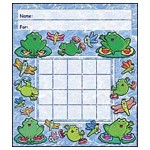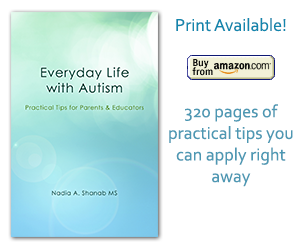Nadia Shanab | autism, general advice, parenting
We all know how tiring, exhausting, and sometimes draining life can be, if you have a child or more than one on the autism spectrum. In this post I would like to suggest some ideas for parents that might help them have a better-balanced life. Your daily schedule is so busy, and your child always
[read more]
Nadia Shanab | autism, general advice, parenting
Some parents are e-mailing me some questions and I would like to share the answers with everyone. Question 1: About Echolalia How can I stop my child from repeating after me word to word? Answer to question 1 Echolalia is one of the most common signs of autism. The child repeats after a person whatever
[read more]
Nadia Shanab | autism, general advice, parenting
In previous articles I talked about the effectiveness of the reward system. First, I prefer to be positive and apply the reward (positive reinforcement) system as much as I can, and seize every opportunity to praise and encourage the children. Most kids work for rewards, and love to be praised and encouraged. But sometimes, the reward
[read more]
16 Jul 2010 | Tags:
autism,
communication,
consequences,
discipline,
incentive sticker sheet,
parenting,
rewards,
rules,
techniques,
tips,
visual timer
Nadia Shanab | autism, general advice, parenting
The story today is about a first grade child with autism who hated to go on the play structure or the equipments on the playground (slides, monkey bars, ladder, spinning wheel, the firemen pole, spiral pole and so on). He used to run all over the place and I couldn’t bring him to go on
[read more]
Nadia Shanab | autism, general advice, parenting, tips
The proverb says: The dog is man’s best friend. Dogs are loyal and they love their masters unconditionally (I prefer to use the word masters over owners). They communicate without language, and understand the body language. If your child doesn’t talk or has poor verbal skills she/he can still have a social life. A dog would be a close friend,
[read more]
10 Jul 2010 | Tags:
assistive dog,
autism,
communication,
dogs,
independence,
parenting,
senses,
sensory,
service dogs,
social interaction,
speech,
tips,
verbal skills
Nadia Shanab | autism, general advice, parenting
This is a technique that I learned about just by trying. A student with very little speech demonstrated a very short attention span for regular work (Math and Language Arts). But I noticed that he showed a lot of interest in the Music class, and was able to focus and stay on task for almost the
[read more]
Nadia Shanab | autism, general advice, parenting, tips
I learned this technique from a great speech pathologist. She recommended it to be used for an autistic boy with very poor speech and verbal skills. She gave me a binder full of pictures (around thirty pictures). The pictures were simple, colorful with large details. The pictures should also appeal to the children. The technique worked
[read more]
Nadia Shanab | autism, general advice, parenting, tips
The human development has three components: Physical (body), cognitive (learning), and socio-emotional development. The three components are tightly related and should develop harmoniously and simultaneously from the first day of birth. (1) For a typically developed child the vision skills must develop automatically along with the motor and cognitive (learning) skills. Many children with autism
[read more]
Nadia Shanab | autism, general advice, parenting
You don’t know which placement is best for your child? Don’t worry! There is a whole system and a team responsible and devoted to find the best placement for your child. By placement I mean the program and the class that best fits your child’s needs. Know Your Rights In case you do not know
[read more]
Nadia Shanab | autism, general advice, parenting, tips
The ultimate goal in special education is to help as many children as possible to get to the appropriate level of mainstream education. By mainstream, we mean a regular education class for typically developed children. The average number of kids in lower grade (kindergarten, first, second and third grade) is about twenty kids, and some thirty
[read more]






